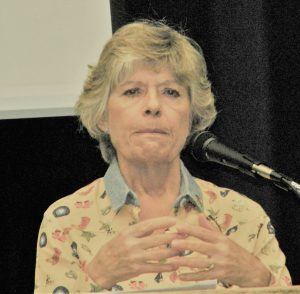

By Michael Howell
Karen Budd-Falen, a Wyoming attorney specializing in land use issues, presented a workshop last Saturday at the Hamilton Middle School that was designed to train elected officials in the process that local government should follow if they want to have a stronger, more effective voice in federal land management issues. According to Budd-Falen, it requires developing a good land use plan that outlines what the county would like to see happen in terms of land management and provides the data to back it up.
According to local State Representative Theresa Manzella, who arranged for the event and paid for it through private donations and a $10 entrance fee, the workshop was designed especially for educating local elected officials. She asked the county commissioners to sponsor the workshop but that request was refused. And when she asked how many elected officials were in the audience, only three people stood up. One Ravalli County Commissioner, Ray Hawk, attended.
The workshop actually drew more protesters than attendees. About 120 protesters, many carrying signs, lined the sidewalk leading into the Middle School building just before the workshop began. There were about 80 people in the auditorium.
“Keep public lands in public hands” was a major theme of many of the protesters who carried signs. The protest was peaceful and took place without any disruption.
Inside, Manzella insisted that the protesters were mistaken. She said the workshop was not about transferring ownership of the national forests to the state. She said it was simply about having more local control over land management.
“We don’t care who owns the land,” said Manzella, “we just want it to be managed properly.” In her view, the state is much better and more efficient at managing public lands. “This is not about the lands transfer issue,” she said. Following Manzella’s introduction, one of the three elected officials in the audience, State Senator Jennifer Fielder (R-Thompson Falls), confirmed Manzella’s view, recounting her own efforts to pass a bill in the Senate to prohibit the sale of any land that was transferred to the state. Democrats opposed the bill but it was passed. Governor Bullock then vetoed it.
One of the attendees at the workshop, Skip Kowalski, former president of Bitterrooters for Planning, was not convinced.
“We smell a rat,” said Kowalski. For one thing, he said, outside this venue, she is a strong proponent of transferring federal land to the state. He said she also sits on the board of the American Lands Council which promotes the transfer of federal lands.
“Irrespective of their intentions, the logical response is that once the lands are under state control, then the state could implement a management scheme designed to solve their budget problems rather than manage a healthy forest.” The county’s interest, in the current political climate, he said, would be to generate income in the short term for the county. Not only that, he said, once the land was under state control, the prohibition could be taken out by the legislature as easily as it was installed.
For her part, Budd-Falen said that the workshop was “not political.” She said it was about the law and having more influence over the management of federal lands. Her remarks were generally confined to discussion of the federal land management process and how the local government could become better involved through “coordination,” “collaboration” and “cooperation.” She said the way to proceed was to develop a local land use plan that was based on good research, good data and good documentation. She said what the process doesn’t allow is for the county to dictate the management plans, but it does allow for more effective participation.
Although it was acknowledged that Ravalli County already has a Natural Resource Policy, this would be a way to “add some teeth to the policy,” she said. She said it doesn’t matter to the federal government what you call it, a natural resource policy, a land use policy or a growth policy. By producing a good local plan, she said, the community can force the federal government to use it to do a “consistency review” with respect to the local plans.
“It forces a dialogue,” she said. It also helps to gain status as a “cooperating agency” and get a good seat at the table. She suggested that, in the process, the county can submit its own action alternative to be considered in the environmental assessment process.
“This is not a war,” said Budd-Falen. “It is an attempt to work together.”
Russ Lawrence, the newly elected president of Bitterrooters for Planning, said after the presentation that he would take Budd-Falen at her word that it’s not about the transfer of public lands at this point and that what she advocates is securing a louder voice for local government in the management process. He said that would be a good thing so long as the process is inclusive of everyone and not an exclusive one. He said Budd-Falen gave some good advice to local elected officials in terms of how to build good, data-based, and effective comments.
“My feeling is that anyone who comments on federal land use policy should have their ducks in a row,” said Lawrence.